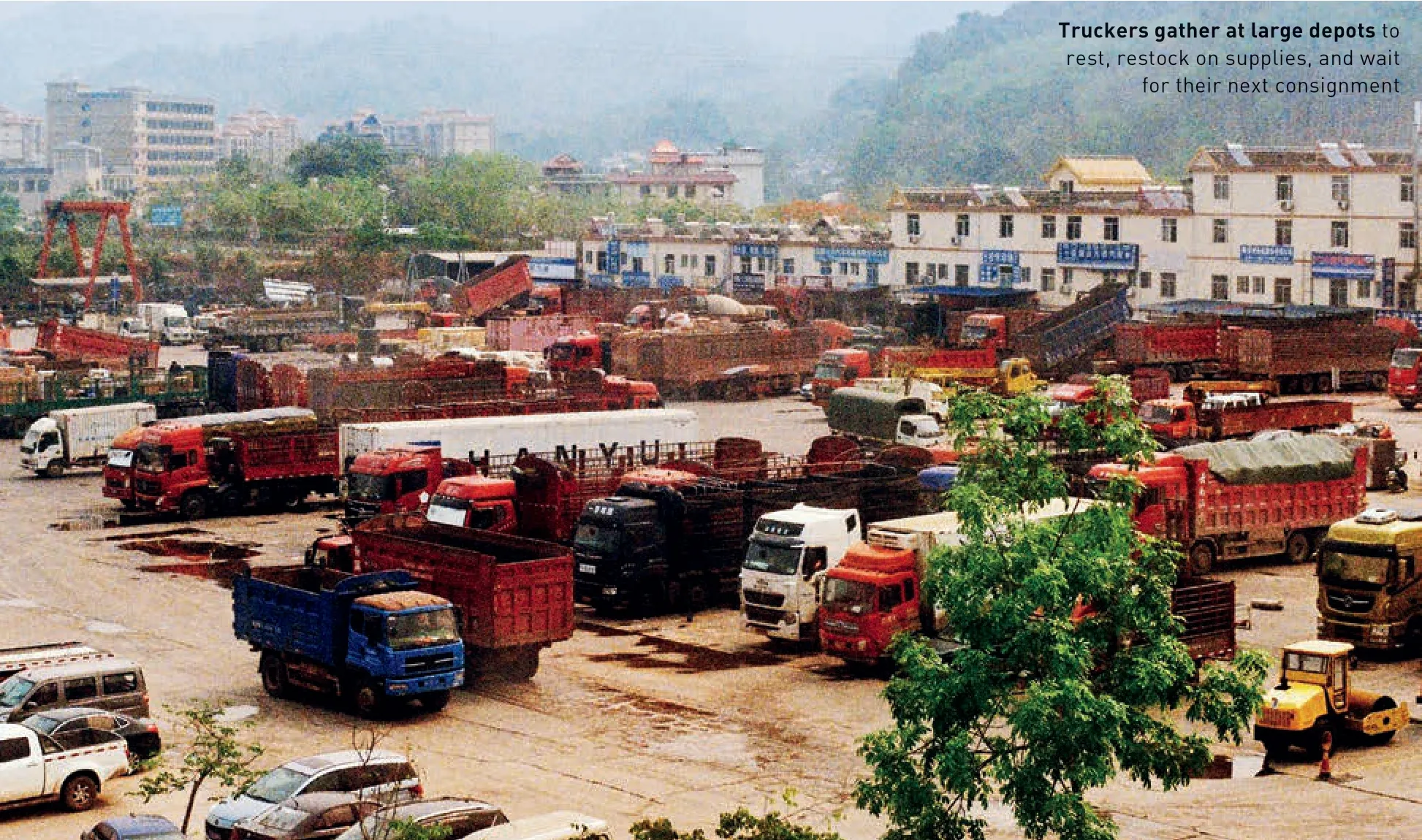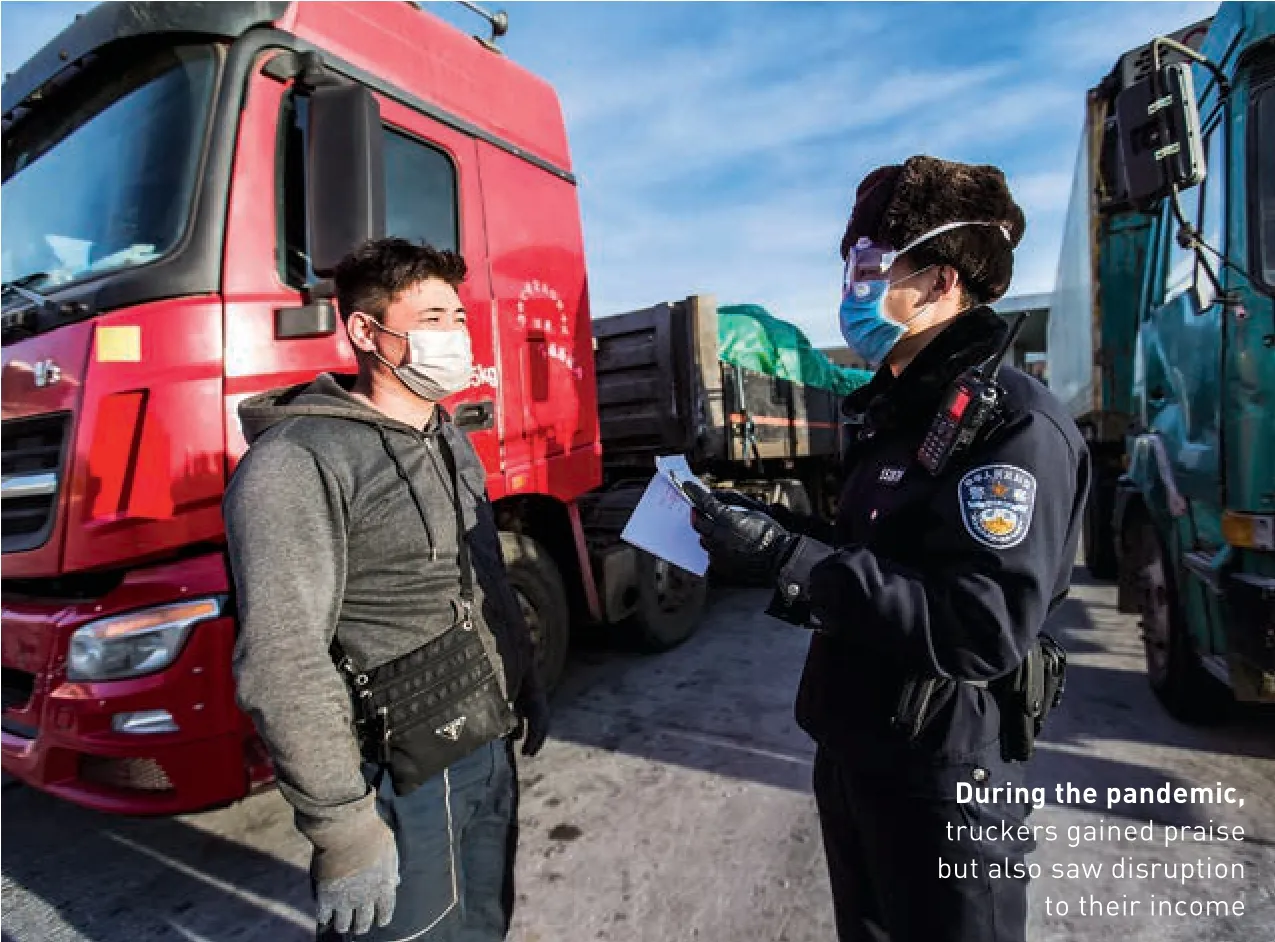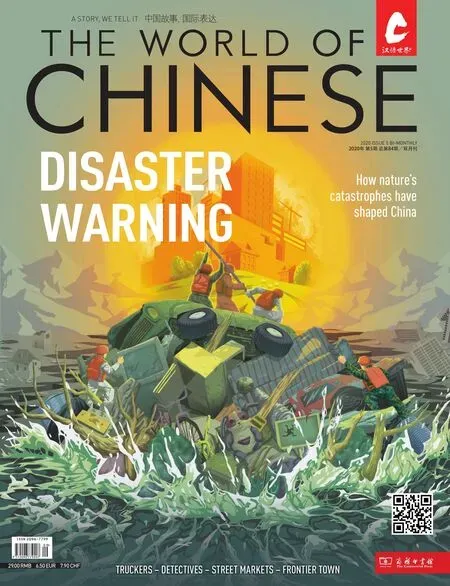WHEELS OFF ORTUNE
China’s truckers try to make a living in a dangerous and increasingly competitive industry
長途卡車司機(jī)每次出車都像是一場未知的冒險(xiǎn)
At 5 a.m. on a gray morning,at a nondescript service station off the highway in Anhui province, Li Zhanwei is going through his exercise routine: some tai chi, a few stretches, push ups, and then,with surprising energy, a handstand up against his truck for a finishing touch.
“I exercise every time I stop,” the 48-year-old driver explains between movements. “You have to, otherwise your body will collapse, and you can’t make money if your body doesn’t work.” Once he is done stretching,Li climbs back into the cabin of his Jiefang model truck and hits the road again, piloting the 50-ton behemoth loaded with paper to a printing factory in Suzhou, Jiangsu province.Li has been on the move since 7 the evening before, stopping for just one hour-long nap at midnight. He’ll arrive at his destination sometime after midday, unload, and then look for a new consignment of goods that will take him back to his hometown of Luohe, Henan province, where he will rest at home for a day before doing it all again.
“Do I like this job?” Li repeats the question back to himself with a sigh. “I don’t have any good feelings toward it, but I need it to survive…it’s a good choice for survival.”
Li is one of China’s estimated 30 million truck drivers who together deliver over 40 billion tons of goods around the country each year. As Chinese manufacturing soared,incomes rose, and internet commerce boomed into a 2-trillion-dollar industry, the demand for logistics and goods delivery has rocketed.
China’s first highway, a 20-kilometer stretch between Shanghai and the satellite town Jiading, opened in 1998,but by 2018, the country had 142,500 kilometers of high-speed roads, giving it the largest highway network in the world. Around 75 percent of freight is transported by road, with 84 million tons traveling on the nation’s highways every day, making truck drivers like Li the lifeblood of China’s economy.
But few envy truckers’ unglamorous yet vital work. According to a 2018 report by Tsinghua University and the Transfar Foundation, over 50 percent of truck drivers earn annual salaries of less than 100,000 RMB. Around 32 percent of drivers show signs of spinal injuries, and they see their families just once every 20 days on average.
Rising competition, fuel costs and toll fees, the introduction of new mobile apps, the dangerous nature of the job, and the unpredictability of fines and penalties are squeezing drivers and freight-dependent businesses, and changing the nature of the industry.
These factors are part of the reason why Li, who has been driving for over 20 years, no longer owns his truck.When Li drove his own truck, he made around 3,000 RMB a month;now he earns a base salary of 4,000 RMB per month, and around 600 RMB for each round-trip between Luohe and Jiangsu, with fuel and toll fees covered by his employer.
Those who own their vehicles have to cover the cost of fuel, tolls,maintenance, and loan repayments themselves, and are also responsible for finding goods to transport. Fuel prices have risen in recent years and China’s toll fees are some of the most expensive in the world, accounting for 10 to 20 percent of expenses of Chinese trucks, 15 times higher than in the US.

Song Yantao, from Shandong province, began driving trucks when he was 18 years old. Now 35, he too works for a logistics company rather than owning his vehicle. “The market competition, the low price for freight transport, pressure of mortgage payments—in the end I gave up being my own boss,” he says. “In a company...our only task is to drive the truck safely to its destination.”Song now earns around 10,000 RMB a month driving 3,200-kilometer round trips from Xuzhou, Jiangsu, to Dongguan in Guangdong province.
In the past, truck owner-operators could make a bigger profit, but they often did so by cutting regulatory corners. “Back then we had a saying,‘If you don’t overload, you don’t make money,’” claims Sun Hao, a 40-year old from Nanjing who drove his own truck from 2008 to 2012.
“We would also modify our trucks.For example, to allow us to drive for long distances we would build an extra gasoline barrel,” says Sun.“It was like turning the truck into a bomb.”
Sun tells TWOC he used to have to drive nonstop to make his deliveries in time. He avoided stopping even to go to the restroom, instead relieving himself into an empty bottle. “At that time, it was the quicker the better. The longest I ever drove without resting was 34 hours.”
Better enforcement of traffic laws and tightened highway management have put an end to some of these practices:“Look at the road. There are police stations and checkpoints everywhere,”says Li as he trundles along the highway, dutifully sticking to the speed limit. Vehicles are weighed at highway entrances, and a truck cannot enter if it exceeds the legal limit. Every truck is legally required to be fitted with a GPS system that monitors the driver’s time spent at the wheel and whether they are speeding.

Still, there are ways around these regulations. Every driver carries two cards for the GPS, Li claims, so they can simply swap cards and continue driving when they reach their fourhour maximum. Overloading is still common off the highway: In October 2019, three people were killed and two injured when a bridge collapsed under the weight of an overloaded truck in Wuxi, Jiangsu.
Even without overloaded or modified vehicles, the risks faced by drivers are high. A 2015 report by the World Health Organization found China had over 104 road deaths per 100,000 vehicles, far higher than the ratio of 33 per 100,000 in the US. A study by researchers at the University of Massachusetts-Lowell in 2014 found that although trucks accounted for only 7.8 percent of motor vehicles in China, they caused 22 percent of traffic deaths.
“We’ve all experienced accidents,”Li laments. “Drivers get tired and crash…this job is extremely dangerous.” Sun left the industry in part because of a crash he had in Guangdong; with the brakes unable to stop the overloaded truck, he ditched into the middle barrier on the highway to avoid hitting a passenger vehicle in front.
“When the traffic police came to sort it out with me, they said that because this road was on a long downward slope there was an accident there every week,” he says. “After this accident, I thought that staying alive was more important than anything else.”
Meanwhile, driving in China’s remote areas and off the main highways can still be a Wild Westlike experience. Gasoline thieves remain a threat, and can cost a driver potentially thousands of RMB, not to mention time on the road, which could lead to a deduction of fees paid by the client waiting for their goods.
Crooked cops demanding bribes,locals extorting “toll fees” from drivers,and thieves stealing goods from the truck in the night were all common.“I used to keep a 1.8-meter knife in my truck…When these people tried to take our goods or tried to make us pay, I would just get out and confront them,” says Sun.
Li says things are improving.“Seven or eight years ago I had gasoline stolen, and even tires…but not anymore because the road management is much better,and people’ssuzhi[character] has improved.”
Still, drivers’ forums on the internet still regularly report cases of theft and extortion, and in August this year, a trucker on video platform Kuaishou accused service stations of charging drivers “protection fees” to guarantee that their gasoline wouldn’t be stolen,implying that the security staff was in cahoots with the thieves.
Better management is welcomed by truckers, but this along with falling freight rates has made making money increasingly difficult. “Before the freight fees dropped to today’s excessively low level, lots of vehicles could afford an extra driver. Drivers could eat at restaurants, sleep in hotels, and take the highway for the whole route,” an article on Trucker Family, a popular news app for drivers, lamented in June.

Now, Li brings snacks and instant noodles along for the ride, takes back roads for part of his journey to find cheaper diesel, and sleeps in his truck(if he sleeps at all).
Online platforms that allow truckers to browse for gigs, similar to how Uber matches passengers with cars,are also changing the industry and how drivers derive their income.Manbang, a firm which has been valued at 6.5 billion USD, owns Huochebang and Yunmanman, the two biggest truck-hailing platforms in China with a combined 13 million registered users, 9 million of them drivers. The company promises to improve the efficiency of China’s freight sector, reducing the time it takes for truckers to find goods and the number of empty trucks on the road.
But Li uses the apps only grudgingly.Once he has delivered his haul in Suzhou, he finds a place to park by the side of the road and browses Yunmanman on his phone for suitable assignments that will take him back to Henan. He makes a handful of calls, which all come to nothing. “It’s better if you can find goods [without using the app] because on the apps the good assignments go so quickly;the competition is very fierce,” he explains.
Manbang, formed when Yunmanman and Huochebang merged in 2017, controls a dominant position in the market and has been accused of driving down freight rates by making truckers under-bid against each other for jobs.
A representative for Manbang told TWOC that the apps help truckers find work more quickly and easily.They also say that the company tries to “spread truck drivers’ voices” by raising awareness of the profession through the media.
But in 2018, dissatisfaction with these platforms, as well as rising fuel costs,seemingly arbitrary fines, and general loss of revenue, resulted in protests by truckers across the country including in Chongqing, Shanghai, Sichuan province, and Jiangxi province. Drivers formed long processions with their vehicles and brought traffic to a halt on some roads, while flying banners with messages such as “Refuse Low Prices” and “End Fatigued Driving.”
Truck-hailing apps are in part a response to the inefficiency of China’s highly fragmented road freight industry. Small companies and single truck owner-operators make up the majority of the market,with 71 percent of vehicles owned by individuals, according to the 2018 Tsinghua-Transfar report. The result is that logistics costs took up 14.8 percent of China’s GDP in 2018, compared with just 8 percent in the US.

In response, China’s State Council called for large cargo and medium and long-distance freight transportation to shift from the roads to rail and water, in part because rail is greener than transporting by truck. But progress has been slow, with rail still accounting for less than 10 percent of freight transportation. Xu Honglei,a researcher at the Ministry of Transport, stated in a forum on air pollution in 2019 that road freight is still cheaper than rail, if less efficient.
Authorities still hope to increase the efficiency of China’s freight industry,but they have mentioned little about improving the working conditions of the drivers themselves. “Truckers’standing in society is low, there’s lots of us so no one really cares about you as an individual,” says Cai Shuang, a trucker for over 15 years.
During the coronavirus outbreak in early 2020, truckers gained greater recognition and were praised for keeping the country fed and delivering urgently needed medical supplies to Hubei province, “but normally people don’t really care,”says Cai.
According to the Tsinghua-Transfar report, over 65 percent of truck drivers consider themselves to represent the lower levels of society.Media coverage of overloading and dangerous driving has given drivers a bad reputation, which the report recommends the government to work to address. “Truck drivers’social position is low, and they have to endure a lot of anger:from loaders, the cargo owners,the bosses,” a trucker from Zibo,Shandong province, stated in the report.
The lack of recognition and tough work make for a lonely existence as a driver. “On that long road I felt very, very bored. There was no one to talk with me. I couldn’t call anyone, couldn’t watch any videos…and I missed my family,” recalls Sun. “But this industry gave me a lot of income, it helped me buy a house, and pay back the mortgage. It changed my family’s lives.”
As Li pilots his truck through the midnight hours with his headphones on, steering with one hand while dipping into a bag of sunflower seeds with the other, he reflects on how he copes with what can be a monotonous life on the road: “You have to look at it as if it’s a trip.Each time you set out it’s a holiday,a chance to enjoy life…I don’t get bored. It’s my job, and I want to do it well,” he says. “And if you’re bored, an accident might happen.”

